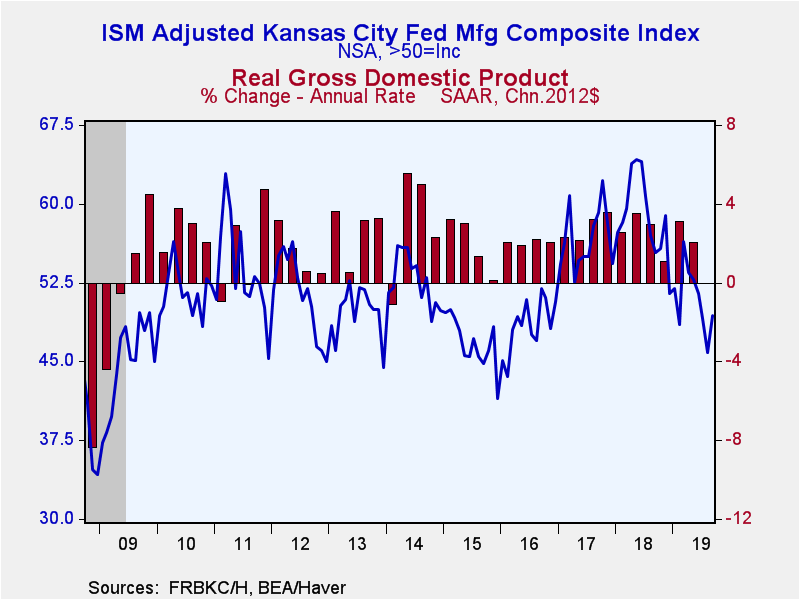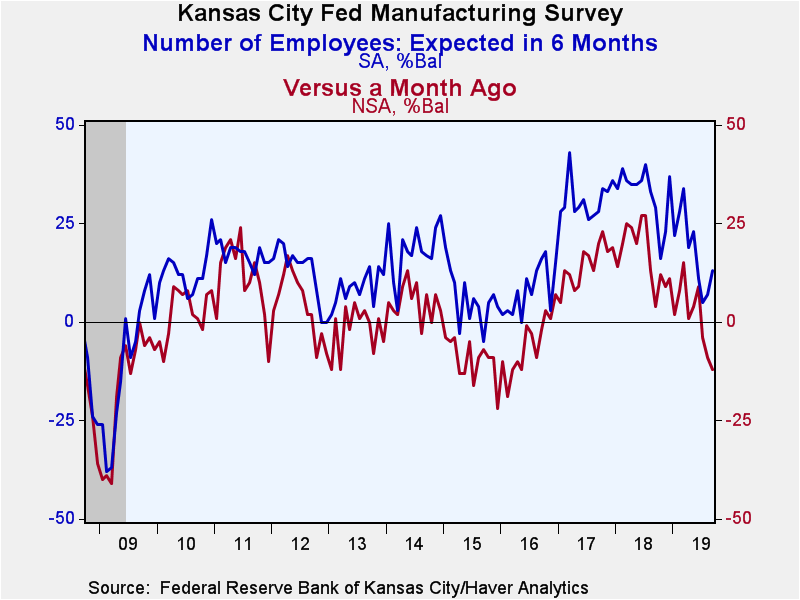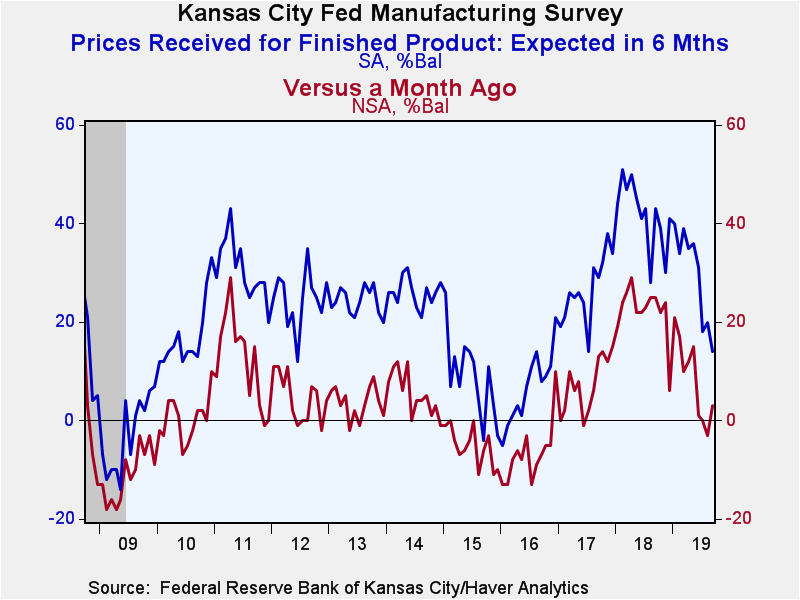 Global| Sep 26 2019
Global| Sep 26 2019Kansas City Federal Reserve Factory Index Remains Negative
by:Tom Moeller
|in:Economy in Brief
Summary
The Federal Reserve Bank of Kansas City reported that its index of regional manufacturing business activity of -2 in September, the third straight negative monthly reading. These negative figures suggest declining business activity [...]
The Federal Reserve Bank of Kansas City reported that its index of regional manufacturing business activity of -2 in September, the third straight negative monthly reading. These negative figures suggest declining business activity overall and were below the high of 26 reached in May 2018.
The ISM-Adjusted index nevertheless improved to 49.4 (NSA) this month and recovered its August decline. It remained below the high of 64.2 reached in May 2018. Since 2008, there has been a 54% correlation between this index and the q/q change in real GDP.
The components of the factory survey were mixed m/m. The shipments, new orders and product delivery times readings improved somewhat, but inventories declined. The production measure rose to the highest level since May but order backlogs remained quite negative. The export orders measure was negative for the third month in the last four.
The employment reading deteriorated m/m and remained below zero for the third straight month, indicating a net decline in job levels. A lessened 12% (NSA) of respondents reported increased hiring while a steady 23% reported a decline in job levels. The employee workweek index rose sharply to a five-month high.
The index of finished goods prices rose above zero but remained well below the highs reached early last year. Seventeen percent of respondents paid higher prices versus 29% twelve months earlier. Fourteen percent paid less versus four percent one year ago. The raw materials prices index was below zero for a second straight month and was down sharply y/y.
The overall expectations index deteriorated to the lowest level since early 2016 and was well below the February 2018 high. Expected shipments, materials inventories and production deteriorated. Employment and new orders rose. The expected capital expenditure figure weakened and remained well below its high early last year. The expected export measure declined for the second month in the last three.
The expected finished goods price index deteriorated to the lowest level in two years and was well below the high reached in February 2018. The expected raw materials price figure declined and remained well below the February 2018 high.
The diffusion indexes are calculated as the percentage of total respondents reporting increases minus the percentage reporting declines. The survey included 94 responses from plants in Colorado, Kansas, Nebraska, Oklahoma, Wyoming and northern New Mexico. Data for the Kansas City Fed Survey can be found in Haver's SURVEYS database.
| Kansas City Federal Reserve Manufacturing Survey (SA) | Sep | Aug | July | Sep '18 | 2018 | 2017 | 2016 |
|---|---|---|---|---|---|---|---|
| Conditions Versus One Month Ago (% Balance) | -2 | -6 | -1 | 13 | 18 | 14 | -2 |
| ISM-Adjusted Composite Index (NSA) | 49.4 | 45.8 | 49.1 | 55.4 | 58.9 | 56.7 | 48.5 |
| New Orders Volume | -3 | -16 | -2 | 13 | 17 | 17 | -2 |
| Number of Employees | -13 | -7 | -6 | 3 | 17 | 15 | -6 |
| Production | 11 | -2 | -6 | 12 | 18 | 17 | 0 |
| Prices Received for Finished Product | 1 | -3 | 2 | 23 | 22 | 7 | -7 |
| Expected Conditions in Six Months | 5 | 11 | 9 | 27 | 28 | 26 | 9 |
| New Orders Volume | 13 | 11 | 17 | 35 | 35 | 35 | 19 |
| Number of Employees | 13 | 7 | 5 | 29 | 33 | 31 | 8 |
| Production | 5 | 23 | 23 | 37 | 40 | 40 | 20 |
| Prices Received for Finished Product | 14 | 20 | 18 | 43 | 42 | 27 | 7 |
Tom Moeller
AuthorMore in Author Profile »Prior to joining Haver Analytics in 2000, Mr. Moeller worked as the Economist at Chancellor Capital Management from 1985 to 1999. There, he developed comprehensive economic forecasts and interpreted economic data for equity and fixed income portfolio managers. Also at Chancellor, Mr. Moeller worked as an equity analyst and was responsible for researching and rating companies in the economically sensitive automobile and housing industries for investment in Chancellor’s equity portfolio. Prior to joining Chancellor, Mr. Moeller was an Economist at Citibank from 1979 to 1984. He also analyzed pricing behavior in the metals industry for the Council on Wage and Price Stability in Washington, D.C. In 1999, Mr. Moeller received the award for most accurate forecast from the Forecasters' Club of New York. From 1990 to 1992 he was President of the New York Association for Business Economists. Mr. Moeller earned an M.B.A. in Finance from Fordham University, where he graduated in 1987. He holds a Bachelor of Arts in Economics from George Washington University.
More Economy in Brief
 Global| Feb 05 2026
Global| Feb 05 2026Charts of the Week: Balanced Policy, Resilient Data and AI Narratives
by:Andrew Cates










